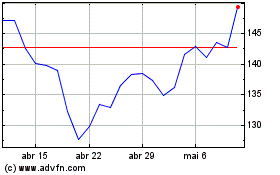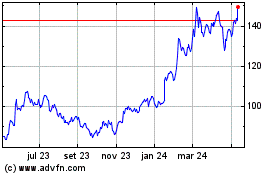U.S. index futures rose in pre-market trading on Friday, with
the three major indices on track for their sixth consecutive week
of gains.
At 05:18 AM, Dow Jones futures (DOWI:DJI) gained 26 points, or
0.06%. S&P 500 futures rose by 0.20%, and Nasdaq-100 futures
advanced by 0.42%. The 10-year Treasury yield stood at 4.097%.
In the commodities market, Brent and WTI crude futures were
slightly positive but on course to close the week down about 6%,
the largest drop since September 2.
China’s refinery output fell for the third consecutive month due
to weak fuel consumption. Markets remain concerned about supply
disruptions driven by Middle East tensions following the death of
the Hamas leader and Hezbollah’s statements on a new phase of the
conflict with Israel.
Partial stabilization occurred after U.S. crude inventories fell
by 2.19 million barrels last week, strong U.S. retail sales data,
and new stimulus from China, though prices remain pressured by a
negative demand outlook.
West Texas Intermediate crude for November rose 0.31% to $70.88
per barrel, while Brent for December gained 0.23%, to $74.62 per
barrel.
Gold surpassed $2,700 an ounce for the first time, reaching a
high of $2,713.93 amid heightened Middle East tensions and U.S.
election uncertainties. Investors sought safety, driving gold up
around 2% for the week. A weaker dollar also contributed to the
rally. Gold (PM:XAUUSD) is currently trading at $2,710.23, up
0.61%.
On today’s U.S. economic calendar, September housing starts will
be released at 8:30 AM, with expectations of 1.34 million, slightly
below the prior figure of 1.36 million. Building permits are
projected at 1.44 million, down from 1.48 million the previous
month. At 12:10 PM, Federal Reserve Governor Christopher Waller is
set to speak.
In Asia-Pacific markets, China’s CSI 300 rose by 3.62%, while
Hong Kong’s Hang Seng gained 3.41% in late trading. Japan’s Nikkei
225 advanced 0.18%, while the Topix had a slight increase. In
contrast, South Korea’s Kospi dropped 0.59%, and the Kosdaq fell
1.55%. Australia’s S&P/ASX 200 declined 0.87%.
Chinese stocks surged after President Xi Jinping emphasized
technological development, boosting chip manufacturers like
Semiconductor Manufacturing, which soared 20%.
China’s diesel exports dropped to 350,000 tons in September, the
lowest level since June 2023, due to limited quotas and tight
margins, marking a 71% decline from the same month last year.
Refineries are grappling with weak domestic demand and shrinking
margins.
China’s economy grew by 4.6% in the third quarter, exceeding
Reuters’ forecast of 4.5% but slowing from 4.7% in the previous
quarter. In September, China’s retail sales rose by 3.2%, and
industrial output increased by 5.4%, both beating expectations.
However, property prices dropped 5.8%, a sharper decline than the
5.3% recorded in August, driven by falling new home prices.
Authorities continue to implement stimulus measures to reach the
5% target for 2024. China’s central bank introduced two new
financing programs, initially injecting $112.38 billion (800
billion yuan) into the stock market through new monetary policy
tools. The PBOC launched a $42.1 billion (300 billion yuan) credit
line to help listed companies and large shareholders repurchase
shares, boosting the market.
A swap facility was introduced, allowing institutional investors
to access central bank liquidity, increasing optimism in the
Chinese stock market.
Moreover, the PBOC is targeting inflated credit ratings, a
problem identified since 2020. On Friday, the People’s Bank of
China convened major credit rating firms to discuss the development
and challenges of the sector as part of efforts to improve rating
quality in the world’s second-largest corporate bond market.
IMF’s Kristalina Georgieva stated that China needs deeper
reforms, such as improving social security and investing in
underdeveloped sectors, to transform its economy into a
consumption-driven one.
Additionally, the United States will use restrictive measures,
such as tariffs, to counter China’s overproduction aimed at
dominating global markets. The White House’s Daleep Singh
highlighted China’s growing power in strategic sectors like
electric vehicles and semiconductors, and the need for Washington
to take steps to protect its industries.
In Japan, overall inflation for September was 2.5%, while the
core CPI rose by 2.4% year-on-year, slowing from August due to
temporary subsidies to curb energy prices. Inflation above the Bank
of Japan’s 2% target will be considered at the next monetary policy
meeting.
TSMC (NYSE:TSM) reported a 54% increase in
quarterly profit and raised its revenue forecast yesterday, after
Taiwan’s benchmark index (TWII) closed. The index rose by 1.9%
today, driven by TSMC shares, which climbed 4.8%, hitting a record
high.
In India, Infosys (NYSE:INFY) raised its growth
forecast for the second consecutive time, which could lift the mood
in the IT sector, which has lagged this year. The company also
added 2,400 employees after six quarters of cuts.
Wipro (NYSE:WIT) beat quarterly expectations. In
the automotive sector, Bajaj Auto warned of weaker
demand, affecting expectations for two-wheelers.
European markets rose on Friday as investors digest consecutive
interest rate cuts by the European Central Bank and await new
economic data while assessing quarterly earnings. Mining,
automotive, and tech stocks benefited from China’s economic
support. Luxury brands also performed well, with
Kering (EU:KER) rising 4.7% and
Burberry (LSE:BRBY) up 3.8%.
Investor attention is also focused on UK retail sales data for
September, eagerly awaited.
The European Central Bank (ECB) cut interest rates for the third
time this year, to 3.25%, aiming to control inflation in the
eurozone as economic growth remains weak. ECB President Christine
Lagarde stated that the disinflation process is underway, with
possible additional cuts in December if economic data does not
improve.
Traders have increased bets that the ECB may implement a
significant rate cut in December. Money markets now see a 20%
chance of a 50-basis-point cut, with 0.25-point cuts expected by
April 2024.
In Italy, the automotive industry faces a serious threat, with
Stellantis’ (BIT:STLAM) vehicle production falling
by 41% in the first nine months of 2023. This decline raises
concerns about potential job losses, leading to worker protests in
Rome. Small suppliers are also at risk due to falling demand and
Chinese competition.
Brunello Cucinelli (BIT:BC) posted a 12.7%
increase in revenue for the first nine months of the year, driven
by strong growth in the Americas and Asia. Third-quarter revenues
rose by 9.2%, beating analysts’ expectations. The luxury firm
projects a 10% sales increase through 2026.
AB Volvo (TG:VOL3) reported adjusted operating
profit of $1.34 billion (14.1 billion crowns) in the third quarter,
below expectations of 15.6 billion and down from 19.3 billion a
year earlier. Sales fell 12%, and heavy truck orders dropped by 7%,
reflecting customer caution.
Keywords Studios (LSE:KWS) acquired U.S.-based
developer Certain Affinity, known for working on
“Halo” and “Call of Duty.” The value was not disclosed, but it
includes an initial cash payment and an earn-out component. The
management team will remain in place.
Comet Holding (LSE:0ROQ) reported a 45.6%
increase in third-quarter sales but lowered its 2024 sales forecast
due to weakness in industrial sectors. Semiconductor demand,
especially for AI, drove growth despite weak consumer demand.
Coca-Cola Europacific (LSE:CCEP) plans to
change its UK stock listing category to make its shares eligible
for FTSE indices. The change, expected by November 15, follows a
recent reform of UK listing rules.
China approved the creation of separate insurance units by
BNP Paribas (EU:BNP) and Prudential
Financial (NYSE:PRU), aiming to expand the insurance
market for foreign firms. BNP partnered with Volkswagen Financial
Services, while Prudential was authorized to establish an asset
management firm in Beijing. China’s insurance sector reached $4.2
trillion in assets in 2023.
LVMH’s (EU:MC) head of wine and spirits,
Philippe Schaus, is set to leave the company soon, amid declining
demand for cognac and champagne in China. His departure comes after
LVMH reported a sales decline in the third quarter, with this
division being the hardest hit.
Boohoo Group’s (LSE:BOO) CEO, John Lyttle, is
stepping down as the UK fast-fashion company, which includes brands
like Debenhams and PrettyLittleThing, struggles and undergoes a
strategic review. Revenue dropped to £620 million in the first
half, and shares fell by 9%.
Future PLC (LSE:FUTR) announced that CEO Jon
Steinberg will step down at the end of next year for personal
reasons. During his twelve-month notice period, he will continue to
work with the company as they search for a successor.
On Thursday, the Dow Jones hit its fourth record in five days,
driven by stronger-than-expected retail sales. The Dow gained
161.35 points, or +0.4%, to 43,239.05 points. The Nasdaq added 6.53
points, or +0.04%, to 18,373.61, while the S&P 500 fell 1.00
point, closing at 5,841.47 points.
Retail sales rose by 0.4% in September, beating expectations,
and jobless claims unexpectedly dropped to 241,000, reflecting a
stronger labor market.
Foreign holdings of U.S. Treasury securities reached $8.503
trillion in August, up 11.5% from the previous year. Japan remained
the largest holder with $1.129 trillion, while China’s holdings
fell to $774.6 billion.
The New York Federal Reserve’s new tool, launched to monitor
market liquidity, suggests that the Fed’s balance sheet can
continue to shrink without immediate issues. The Reserve Demand
Elasticity indicator shows that bank reserves remain abundant, and
balance sheet reduction proceeds as planned.
Treasury Secretary Janet Yellen stated that Donald Trump’s
proposal to raise tariffs to isolate the U.S. economy would hurt
consumers and make businesses less competitive. Yellen advocates
for international economic cooperation to address challenges like
Russia’s invasion and China’s trade practices, emphasizing that
severing trade ties would be a mistake.
On the earnings front,
Comerica (NYSE:CMA), American
Express (NYSE:AXP), SLB (NYSE:SLB), Procter
& Gamble (NYSE:PG), Regions
Financial (NYSE:RF), Fifth Third
Bank (NASDAQ:FITB), Ally
Financial (NYSE:ALLY), Autoliv (NYSE:ALV), Simmons
Bank (NASDAQ:SFNC) and Acme United
Corporation (AMEX:ACU) are set to report before the
opening bell.
Taiwan Semiconductor Man... (NYSE:TSM)
Gráfico Histórico do Ativo
De Set 2024 até Out 2024

Taiwan Semiconductor Man... (NYSE:TSM)
Gráfico Histórico do Ativo
De Out 2023 até Out 2024
